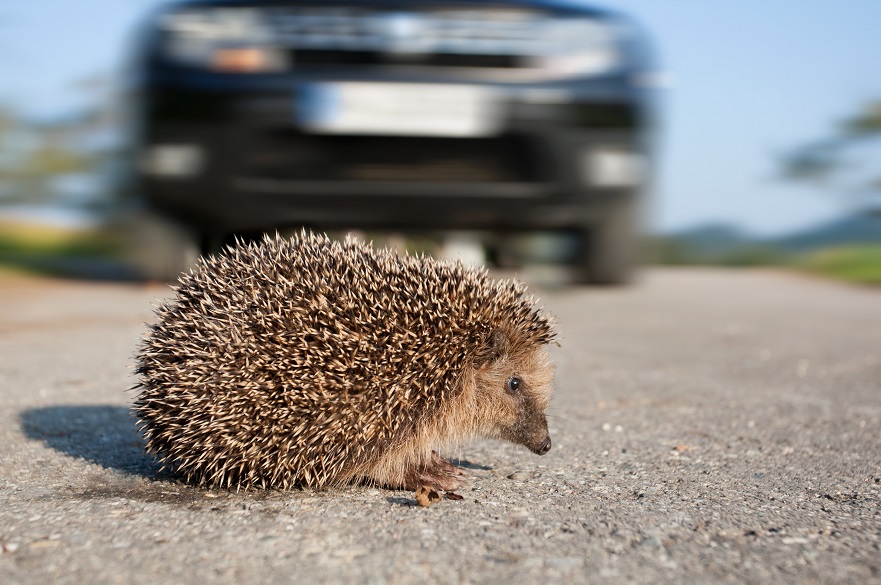Study to investigate role of UK roads on declining hedgehog numbers
Researchers have embarked on a new study to assess the impact that roads and traffic are having on the UK’s native hedgehog population.
By Dave Rogers | Published on 10 March 2020
Categories: Press office; Research; School of Animal, Rural and Environmental Sciences;

The Nottingham Trent University study – part-funded by wildlife charity People’s Trust for Endangered Species (PTES) – aims to investigate the numbers of hedgehogs killed on UK roads annually and whether the issue is so serious in some areas that it is causing local populations to disappear completely.
The recent State of Britain’s Hedgehogs report, published in 2018 by PTES and the British Hedgehog Preservation Society, revealed there has been a 30% decline in the number of hedgehogs in urban areas since 2000, while numbers in rural areas have declined by half. Possible reasons for this include loss of habitat and food sources; increased predation and competition with other mammals; and deaths caused by road collisions.
It is estimated that approximately 100,000 hedgehogs are killed on UK roads every year, according to a PTES study in 2016, and this is thought to be a major factor in their decline.
The new study will examine which individuals – male, female, young or old – are most at risk of being injured or killed on the UK’s roads and whether road tunnels are effective at reducing the risk to hedgehogs.
To understand if and how roads are impacting populations, the researchers need to assess road casualty figures alongside population size and growth.
The work will include a dozen study sites across the UK, six of which include tunnels of various sizes.
Population sizes will be recorded through a variety of methods including nocturnal surveys and genetic analysis from hair, droppings and tissue samples. Movement,frequency of road crossings and roadkill numbers, as well as the use of the tunnels, will also be closely monitored.
It is hoped that the work could be used to provide guidance to spatial planners and developers and lead to recommendations to nationwide long-term monitoring for hedgehogs and other species.
“We need to know whether roads are affecting the long-term viability of hedgehog populations,” said Lauren Moore, a PhD student in the university’s School of Animal, Rural and Environmental Sciences.
She said: “To the best of our knowledge, the impact of roads on hedgehogs has not been investigated in this way before. There have also been no studies to examine whether tunnels are effective at reducing hedgehog road mortality or what attributes of a tunnel could make them more effective. There is a huge gap in terms of the potential conservation options for this species.
“We hope this work will prove incredibly important to our ecological knowledge of hedgehogs and provide the most accurate estimate of the consequences of roads on hedgehog populations to date.”
Nida Al-Fulaij, Grants Manager at PTES, said: “The findings from Lauren’s research will help us to identify whether hedgehog road mortality rates are high enough in some places to cause local populations to become extinct. Her work, alongside small changes we can all make to our gardens, could all help save this iconic species from further decline.”
Notes for Editors
Press enquiries please contact Dave Rogers, Public Relations Manager, on telephone +44 (0)115 848 8782, or via email.
About PTES
- PTES, a UK conservation charity created in 1977, is ensuring a future for endangered species throughout the world. We protect some of our most threatened wildlife species and habitats, and provide practical conservation support through research, grant-aid, educational programmes, wildlife surveys, publications and public events.
- PTES’ current priority species and habitats include hazel dormice, hedgehogs, water voles, noble chafers, stag beetles, traditional orchards, native woodlands, wood pasture and parkland and hedgerows.
- PTES has Species Champions for three of its priority species: for hedgehogs The Rt Hon Chris Grayling, MP for Epsom & Ewell, for water voles The Rt Hon Hilary Benn, MP for Leeds Central and Chair of the Brexit Select Committee, and for dormice The Rt Hon Matt Hancock, MP for West Suffolk and Secretary of State for Health and Social Care.
- Visit www.ptes.org and follow PTES on Facebook, Twitter, Instagram, YouTube & LinkedIn.